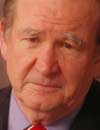- Floyd Abrams
First Amendment attorney - Carl Bernstein
Reporter - Patrick Buchanan
Commentator; former adviser to President Nixon - Walter Cronkite
Former anchor, CBS Evening News - Lucy Dalglish
Executive director, The Reporters Committee for Freedom of the Press - Len Downie
Editor, The Washington Post - Randall Eliason
Former prosecutor - James Goodale
First Amendment attorney - Jeff Jarvis
Blogger, BuzzMachine - Nicholas Kristof
Columnist, The New York Times - Judith Miller
Freelance reporter - William Bradford Reynolds
Former assistant attorney general - William Safire
Columnist, The New York Times - David Szady
Former assistant director of counter-intelligence, FBI
Journalists are not licensed professionals. We're not doctors; we're not lawyers; we don't give a marriage license to anybody. So why should we have a privilege?
Well, not because you're all great guys. The only reason you should have a privilege, if you should, is because of what you do. It just may be so important to keep the process open of gathering news and disseminating it to the public -- that may be such an important, a pro-public interest factor that there should be a significant level of legal protection for the press.
Many courts have said that, and just about all the states now have said just that; that because of the function played by the press, the role of the press in American life, that with all the qualms people may have, ... that it's important enough to keep the press free of fear of going to jail, of not being able to promise confidentiality and mean it to a source, that there should be legal protection. ...
You as a reporter can have whatever informal relationships you want -- trading information or learning things -- but when a federal grand jury sends you a subpoena, you don't have any right to withhold that information.
That is correct. The Supreme Court [in Branzburg v. Hayes] has said you do not have a right. It then becomes an act of civil disobedience.
What if in the Watergate story a federal grand jury had been convened to investigate leaks from the White House and elsewhere, and you received a subpoena? Would you have gone to jail?
Absolutely. I would do it today. It's happening today. You have no choice if you are going to maintain the principles of good reporting. But incumbent on you in these confidential relationships is not to abuse this principle, and I think there is considerable abuse of it. And that abuse comes often from reporters not trying to find information elsewhere, where they might be able to get it on the record. ...
You don't think journalists have a right to protect their sources?
I think they have an obligation to protect their sources, a duty to do so, but I do think that the journalists really do not have special rights that do not attach themselves to other citizens, no.
So then how can you protect your sources?
I think you just do your best to protect them. I don't understand this. If I were a White House aide, for example, and I'd been told something in secret -- as I was. I was hauled before the grand jury; I had to talk about my conversations with the president of the United States.
You mean if I talked to a journalist, he doesn't have to tell about his conversation with me, but I have to talk about my conversation with him? ... When I leave the White House as a sworn assistant to the president and become a columnist, why do I suddenly get new rights?
Why do you think there's a First Amendment clause in the Constitution in the Bill of Rights?
So that the press is free to report and comment on what it wants.
How can it do that? How can it gather information, particularly about government, without some protection to the people who are willing to talk to you?
It looks like it's been going just fine. (Laughs.) I haven't noticed any chilling effect in this town on people talking to reporters because of the Judith Miller episode.
Or the pending leak investigations that are going on.
No. It's going to start happening again.
I'm going to change the subject slightly to confidential sources, which is a major issue these days. How far should a reporter go to protect their sources? Should you defy a grand jury?
It depends on how you got the story, ... what the conditions of the subject were. If he or she said, "I will tell you something only if you don't reveal the source of the story," if you made that commitment, you've got to dodge around it somehow or another. ... Somehow or other you'll have to be able to report to the people that you cannot give them the source.
Now, today The New York Times ... [tells] you why they can't tell the source every time, and it turns out to be almost a paragraph of type on why the individual doesn't want you to use his or her name: "We cannot reveal their name because they have not gotten permission from their employers." Well, that gets into an awful lot of explanation every time, it seems to me.
Do you remember the case of Earl Caldwell, who was the reporter for The New York Times who was subpoenaed by the federal government to testify about the Black Panthers?
Yes.
This is 36 years ago. You were one of the first people to come to his defense. ... Are you saying that it's all right for a reporter to defy law enforcement?
... If it is really a question of taking testimony from an individual from a story that we have run, and we have protected him or her because to expose their names would cause serious difficulties on their side, ... then I think we should be protecting the democracy and the individual to the degree of going to jail if necessary.
We are in the position there of being the endangered party because we could go to jail, as we have seen only too recently, I'm afraid, if we don't reveal a source in a courtroom environment. Well, that courtroom can many times be, unfortunately, also politically biased and just as willing to hang a reporter ... as chances would permit. We've got to be able to defend ourselves in that situation. ...
Law enforcement is not always without politics involved. The people in law enforcement ... can be heavy in politics themselves, and they may be wishing to better themselves in the political atmosphere. Simply because they are in law enforcement they are not holy. ... There is a time when the reporter must make a judgment that revealing their source is more dangerous to the democracy than not doing so, and if the reporter feels that there is politics particularly involved, then the reporter's motivation is tripled -- quadrupled -- to not reveal his or her source. ...
... Yesterday we interviewed a recently retired head of counterintelligence for the FBI, [David Szady], who was in charge of investigating leaks of national security information -- for example, the eavesdropping NSA [National Security Agency] leak -- which the head of the CIA says has demanded an investigation. And he was adamant. He said, "No one has the right to reveal secrets that might damage the national security of the United States." Who are you, for example, Mr. Cronkite, to decide on your own that you should reveal that kind of information that could damage the country?
... Well, it depends on the information, I'd say. [The reporter] should not carry this burden alone, but if his newspaper or his broadcasting organization -- his leadership -- agrees with him or her that this story is important to the survival of the democracy -- literally, of that importance -- then I say that they break the pledge of secrecy and go on the air with it, or into press. ...
Certainly they're taking a risk. But then, when they get into the courtroom, they continue to protect their sources, then the public should understand ... with the trial what was at stake, or what the individual thought at stake. ... If you're an investigative reporter, you're going to face that situation sooner or later. Then the courage of the individual will [determine] whether he or she reveals sources. ...
When you see reporters testify, giving up their source and testifying, as is happening in the Valerie Plame case, what's your reaction when you see reporters giving up their privilege?
... When I see them ... surrendering to the demands of the courtroom, I cringe. I hope that they were able to hold out against revealing their sources. I do believe that this is fundamental in reporting, our integrity. ...
Why should reporters have a privilege that no one else has?
I wouldn't say no one else has. Under certain circumstances, they recognize testimonial privileges for doctors, psychotherapists, priests, lawyers. The law clearly recognizes that there are certain times when people need to be encouraged to come forth with information. ...
Reporters take the need to collect information and the responsibility of collecting information very seriously. To a reporter, if you make a promise, you have to keep that promise, or you're not going to be able to do your job any longer. It's that simple.
When you look at the academic literature and the case law and just common sense, there are really two main reasons why reporters feel that they need to be able to protect confidential information. One is the public needs a flow of information. There are times when the only time you can explain information to the public is if you can get an anonymous source to tell you something. ...
The other is really the independence argument. ... I think it's [that] the ability of the media to operate independently without being perceived as being an arm of the government is very, very important to our democratic society. We need to be able to assure the public that the information that we are giving them has been independently collected. And hopefully these citizens are going to take that information, study it and make an educated, informed decision at the ballot box.
Let me play devil's advocate for a minute. There was a movement in Congress 30 years ago to provide a federal shield law, and the news organizations could not agree on what a reporter was and whether a reporter should be licensed. So isn't the problem here that reporters want it both ways? ...
I agree that it's a sticky issue, and it's a difficult one. There's certainly a lot of tension there. But I disagree with your description of why the bills didn't go anywhere back then. ...
Mostly what happened was the major news organizations and the major nonprofits that represent journalism organizations couldn't agree on what it was they wanted. ... There were those folks who said the First Amendment is enough. Then there were the people like my organization, who said: "We absolutely want a shield law, but it has to be absolute. We have to have the absolute ability to protect confidential sources." There were the others -- the Newspaper Association of America and others -- who said: "You know what? That's never going to fly with Congress. We have to be willing to compromise." ...
So for the last two and a half to three years, media organizations have been working very, very hard at trying to come to some sort of agreement [as to] what they will tolerate, what they want and what they are willing to give up in exchange. We still have a lot of reporters who are saying, "If you can't provide an absolute privilege for confidential sources, phooey on you." Others are saying, "Well, a little bit of protection is better than nothing."
There's nothing about this topic that's easy. It's been a very difficult couple of years. And in the meantime, we still have reporters who just keep getting slapped with these subpoenas.
How do you feel about reporters testifying?
We oppose it strongly, and we vigorously oppose it for as long as we can. In some cases we are able to work out an arrangement with a prosecutor or a lawyer in a case where there's very limited testimony -- usually in a deposition, not in the court, because you can limit testimony more easily in a deposition. We agree to certain ground rules where the testimony will not go beyond a certain point. And we never, ever reveal a confidential source; if we're not released from that confidentiality pledged by the source, we do not reveal that source. ...
... How did we come to have this notion that the First Amendment, which meant the freedom of the press, implies this reporter's privilege?
Well, we don't. ... The reporter's privilege is a fairly recent development, just in terms of legal history. Things like attorney-client privilege or spousal privilege, clergy privilege, those all have long, long historic, common-law roots that even predate the founding of our country. Reporter's privilege and arguments for the privilege are a fairly recent thing, sort of in the last 50 years or so. ... Where they've been most successful is in ... getting the various states to pass shield laws. ... But for more than 30 years, since Branzburg, federal law has been [that] there is no constitutional privilege, and Congress has repeatedly declined to pass a federal privilege law. So at least within the federal system, you're still left with this debate among the courts about what exactly does Branzburg mean, and when does it apply?
... How much can common law be used to eke out a case for reporter's privilege?
I think the common-law argument is the strongest argument that privilege advocates have now, because there is room to argue. Branzburg says no First Amendment privilege, but we can argue for a common-law privilege. And there's a federal rule called 501 that says the courts can interpret privileges in light of the common law. Some have argued that means the court should find a common-law reporter's privilege based on the fact that almost every state has a reporter's privilege. ...
The counterargument to that is Congress has repeatedly considered passing a federal privilege and hasn't done it. And it really is a legislative decision, because there are a lot of policy concerns, and balancing has to take place about when should the privilege apply, when should you allow it to be overridden, what kinds of cases, things like that. ... For a court to reach in and discover a privilege in common law after Congress has repeatedly failed to pass one is really not appropriate, because the court is sort of legislating. That's the counterargument. But that is sort of the hot area now, is trying to get courts to recognize a federal common-law reporter's privilege.
Are there ever any circumstances in which it's legally acceptable for a reporter to refuse a subpoena?
Yes, there are. ... There's a lot of disagreement on this among the lower courts, but in cases that are not grand jury investigations, a number of courts have recognized a reporter's privilege, ... especially in civil cases. ... So it's always a balancing test in the courts that depends on what kind of case it is, and then also on how compelling the need for the information is. ...
... What we wanted to argue was that reporters did not have to testify under all circumstances. The government wanted to have an absolute position: "Whenever we want your information, reporters, you give it to us." Our position was, "No, you can't do that." We did not take an absolute position. ... What the press argued was that it did not have to give information or testimony to the government under all circumstances, only some special circumstances, which didn't exist in this case.
Even if it's a grand jury? Even if it's a federal grand jury?
Even if it's a grand jury. Doesn't make any difference who it is. We're the press; ... we're over here, this information is ours. You're over there, the government, and the twain shall never meet. We want to have some distance between the two of us, a line between the two of us. … The press can't be the arm of law enforcement because if it is, there's no ability for the public, for which the press is a surrogate, to criticize the government and look into what the government's done wrong. ...
To create that separateness, we came up with this idea that we, the reporters, should have a privilege -- namely, the reporter's privilege -- not to cough up this information every time the government wants it. This case involved a grand jury subpoena, and we told the government that the grand jury can't get this information unless you can show us that it's absolutely essential, that you really need it. And the judge bought the argument.
So it went up from the District Court --
And then it was ultimately appealed to the Court of Appeals, and they affirmed it, effectively. And then it went to the Supreme Court. ... But it went up with other cases. ...
What happened was all of a sudden, the same thing happened throughout the country. ... In Massachusetts and in Kentucky, two prosecutors, for whatever reason -- perhaps they saw what the government was doing -- sought to get information for its purposes for the state. ... In the case of Branzburg, the state prosecutor wanted information that [Louisville Courier-Journal reporter Paul] Branzburg had, effectively, about making marijuana. ...
In that case he lost, so he went up to the Supreme Court as a loser, along with Earl Caldwell, a winner, and [Massachusetts television reporter Paul] Pappas, a loser. So those three cases were combined, and I lost the name Caldwell because C comes after B. Branzburg is the name of the case.
And what did [the Branzburg case] decide?
... When the case came out and everybody had to read it quickly for next day's paper, it was reported that the case decided the press had no rights at all with respect to protecting this information. There was no reporter's privilege in the federal courts. ... I just wasn't going to buy that argument.
What do you mean, you weren't going to buy the argument? It's called the Supreme Court for a reason.
I know, but there's always a way to win press cases, I think. ... This is after the Pentagon Papers suits, by the way -- starts before, ends after. This is 1972. I won the Pentagon Papers all by myself, you know. ... After a while it goes to your head. But I could not as a practical matter go back to my pals in the newsroom and say, "I can't protect you because the Supreme Court has taken all your protection." You can't do that. ...
So I went back. I sent my family away, locked myself into a room in my apartment. The air conditioning was turned off, and I sweated out five pounds and a theory how the Branzburg case actually created a reporter's privilege for reporters, even though it seemed to have done the exact opposite.
You created a fantasy in your own mind?
(Laughs.) Some have said so, yes. Well, what happened was, in the Supreme Court you get nine votes, and in this particular case, you get ... four [opinions] ... against us, four [for us], and one in the middle, [Justice Lewis] Powell. Powell's the middle guy. Powell says effectively, "OK, I'm with you against the press on this case -- that's the grand jury subpoenas, under these circumstances -- but in other cases, there should be an ability for the press to deal with the subpoenas." He didn't spell out exactly what he meant.
So I said, well, look, if ... he's one and I've got four over here, last time I knew that made five, and that's more than the four that voted against me. So if I get another case that is perhaps a little different than Caldwell's case, I will argue that those five votes create a reporter's privilege. …
I had called a whole bunch of people before the case started to see if they would support me, The New York Times, in the Supreme Court. Well, I went back to all these people and I said: "I'm going to have a seminar and we're going to discuss freedom of the press. We're also going to discuss my little article [reinterpreting the Branzburg decision], and I'll see if I can persuade you to take that article and go back and fight this thing out state by state by state by state until we end up with enough body of law so that there's protection for reporters." …
I've been doing that for 35 years now, every year. ... Our theory was, and is still, ... go back and fight this thing out state by state by state by state until we end up with enough body of law so that there's protection for reporters. ... Get the state courts and the federal courts sitting in a state area, see if they can adopt my idea in this ... article; get lots and lots of cases, and we'll build up a whole body of protection for reporters. That was the theory. ...
I believe in the need for shielding sources and whistleblowers from exposure, so what they know can come out and reporters can bird-dog government as a result. But it does become difficult when journalism opens up and anyone can do it, because if we try to decide [that] only professional journalists get this protection, we've just licensed journalists, and we've just given the power to the government to take away that license, and that's no good. ...
The question is if you expand the world of journalism to your 5 million bloggers or more, do they get the right to defy law enforcement, to defy a grand jury?
That's exactly the issue, and I believe that we cannot create a class system of journalism and say that only some people performing certain acts of journalism get protection that others who perform acts of journalism do not. That just does not wash. We can all publish to the world now; we can all be journalists now. But yes, that does complicate things when it comes to criminal prosecution, and I don't know where we end up. I don't have an answer. It's a rare thing for a blogger to say, but I don't have an answer. ...
The interesting thing about Josh Wolf to me ... is that I think ... professional journalists, the journalism organizations, the mainstream media and the online Web sites that say they're journalist Web sites haven't rushed to his defense.
Well, there have been bloggers who have defended him, and there are organizations of bloggers working to defend him, and I blogged about it as well and pointed attention to it, which is really all I could do. I think that's an issue. We in professional journalism have to recognize that we have colleagues who are out there in the amateur ranks, and that if their rights are impinged, so are ours. ...
Do you think Josh Wolf should be in jail?
I don't think that Josh Wolf should be in jail. ... However, there are cases where a journalist has facts that are relevant to a crime, and maybe that's a lie, I don't know. That was part of the fight around Judy Miller and The New York Times, was that she had some awareness of a crime being done in government. So the irony there was that we weren't bird-dogging the government for what they were doing. It's a touchy issue, and I'm not sure where I come down. ...
You think it's a gray matter for journalists? They have to decide on a case-by-case basis whether or not to protect that source?
It's what they do. They decide when the discussion starts whether to make that deal. ...
But once you make that deal, do you, Jeff Jarvis, blogger-journalist, are you willing to go to jail to protect that person?
I don't know. I don't know, because if I believe that person was defrauding [me], does the deal still hold?
Well, let's assume they didn't defraud you. ...
I don't know.
So be careful if you tell Jeff Jarvis, blogger, a secret?
Yeah. And I abhor those secrets as a rule. When people try to talk to me off the record, I hate that. I often leave events that are held off the record, because I think it's usually silly. We rely far too much in our business on anonymous sources. We don't reveal enough to people because we got too addicted to that. To allow anonymity is a precious thing.
Now, of course, you're going to say there's anonymity aplenty on the Internet, and that anonymity, by the way, is a very important tool for people to be able to say what they want to say unhindered. But I always tell them in my blog that if you don't have the guts to stand up behind what you say with your name, I am going to respect what you say less; I'm going to trust it less. That's my decision; that's my gauge of trust. So in any case in journalism, when we use anonymous sources, we are holding something back from the public that allows them to judge the veracity of what we're reporting to them. ...
So how do you rate Mr. [Bob] Woodward's reporting a series of books, for instance, on the Bush administration replete with [anonymous sources]?
It's part of what we know. I'm just saying it's simply better if we know the source. Am I saying that I don't trust it at all if it's an anonymous source? No, but I'm saying that if I understand who the source is, I'm going to be able to judge that information better. ... It may seem a little glib, but I would also argue that today Deep Throat could have had a blog, could have been anonymous on the Internet, could have revealed something to the world anonymously. ...
But if Deep Throat had done that, and it hadn't gone through The Washington Post, ... it's not clear anybody would have done it at that point, because [there] was no way to evaluate who the source was. ...
True, and to this day, until only a few years ago, we couldn't judge that source, so we judged Woodward, which is fine. We chose to, and he was right, and he went and did a lot of work to confirm what that source said. The story did not come whole from the source. That's the whole part of the story, is that they went out and reported. ...
Right. You have to use standards. You had to have editors pound at you --
The more you do of that, the more reliable your reporting is, whoever you are. ...
Is it ever OK to reveal your sources?
There are some times when it is OK to reveal your sources. If your source has died, if they have burned you -- given you false information or gravely manipulated information -- then it is OK to reveal them. But I think that has to be done very, very carefully. That is not a step you take lightly. Frankly, I also think it depends on the context and on the risks to the individual. In this country, if somebody is going to be fired from their job, then I would protect that person's identity much more carefully than if it was somebody for whom it was simply a convenience to be anonymous. In China, there are sources that I had whose lives were at risk. I protected those names incredibly closely.
The irony here is that the complaining witness, if you will, the victim was the CIA. They complained to the Justice Department that there was a potential violation of the agent identification act because of Mr. Novak's article, and that's a national security issue. The woman in question, Valerie Plame, was an undercover agent or undercover official, so she was potentially in danger. ... Do you think that reporters shouldn't be answerable in those circumstances?
No. I think that reporters ought to have an absolute privilege.
Absolute?
Except in cases of imminent harm to an individual or imminent harm to national security. I think the broader the statute, the better protection of the public's right to know.
So journalists should be able to determine what's public and what's not, when it's a matter of national security and classification?
The Constitution decided that. The First Amendment decided that. That's our system.
But there are limits on it.
News organizations make those decisions every day, and the fact that the administration in this case has chosen to go after, to pursue so many criminal investigations involving so many reporters I think ought to raise questions in the public's mind about whether or not the administration wants them to have information the press wants them to have.
How did you feel personally about [the reporter's privilege]? ...
... My own personal view is that the reporters are no different from those of us who are in society generally, and there are responsibilities and requirements out there that if subpoenaed, you have to go testify before a grand jury. It's hard for me to recognize why there should be an exception for a reporter if there's not an exception for anybody else.
We all have free press and free speech rights. I am entitled to write what I want to write and speak what I want to speak under the Constitution, but it doesn't give me a testimonial privilege that excuses me from testifying if I witness crimes or am involved in crimes or I'm associated with somebody who is involved in crimes. So it's difficult for me to accept that a testimonial privilege should be fashioned for those who are in the press that excuses them from an obligation that everybody in the country has.
So what do you say to reporters who argue ... how do you actually go out, do investigations, and promise somebody who's come forward confidentiality if you know ultimately you have a very high risk of going in front of a grand jury? ...
… I gather the reporter's mantra is: It's the public's right to know. I believe the public probably has a right to know about criminal activity, but I'm not so sure that if it's the public's right to know that, it isn't the grand jury's right to know that.
The lines that are drawn are very self-serving. Reporters can go out and report on whatever they want to report, and I think that if they feel as a matter of principle that they should stand firm on their confidential sources, they should do that, but they should also do it knowing what the consequences are. The consequences are likely that they will be held in contempt and be sent to jail or whatever the court response is. That doesn't mean they can't do it. We're not talking about prior restraint on the press. We're not talking about telling the press they can't report. We're not telling the press they can't do their job, if that's what they feel their job is. But there are consequences. …
So let me just play devil's advocate. ... For someone like yourself, you're not going to actually go to jail and lose your job at the same time. In other words, if you witness something and you decided, "I'm not going to go in front of a grand jury," that's a personal decision you're making. As a reporter, that's your whole livelihood. ...
Why is that? If I go to jail as a private citizen for making the same decision, I can't do my job. I'm sitting in the slammer just like the reporter is. I'm not able to do my job as long as I'm in jail; neither is he. His decision, as I understand it, is I can do my job better if I go to jail, because my sources will believe that if I tell them that I will maintain confidences, I will maintain them. So in that instance, it is serving his career-path interest not to disclose, much more probably than in my instance if I'm a private citizen. ...
... But someone like [New York Times reporter] Earl Caldwell and [Times counsel] James Goodale, when I asked them these questions -- and actually including [attorney] Floyd Abrams as well -- they all gave me this argument, which was, reporters cannot be, in their mind, ... another arm of the government, of prosecuting criminals. What do you say to that argument? ...
Well, I think law enforcement at both the state and the federal level have recognized that it would be imprudent and inappropriate to use the press as an investigative arm of government, and there are Department of Justice guidelines at the federal level that say that that should not be done and that the U.S. attorneys should not do that. ... At the state level, there are any number of shield laws and other state justice rules that say you're not [to] use the press as an investigative arm of government.
But to overstate that and say that that, therefore, is a reason to say we never shall be called to account is really to misuse the reporter's prerogative in that regard. I think that the public has a right to know. I also believe that if the reporter knows the identity of somebody who's committed a crime, the public has a right to know that just as much. ... I don't see that the First Amendment freedom of the press provides the reporter with the ability to make that kind of personal judgment as to which of those pieces of information is more important for the public to know. ...
Well, now, probably because there's a special investigator, a special counsel who works outside the guidelines of the Justice Department, that started this whole business of subpoenaing reporters and their notes. Because it had to do with the feeling that the administration was leaking something deliberately and that would harm a critic because that was the feeling then, suddenly reporters, journalists who would protect sources said, "Well, you don't protect all sources."
They lost sight of the principle, and the principle is this: The government has all kinds of ways to get information. It can eavesdrop; it can wiretap legally; it can offer immunity to criminals, to people who have committed what seem to be crimes in order to get them to testify. The long arm of the law is a powerful arm in getting information.
What is the essential route to get information by the press? That is to offer a confidentiality, so that if somebody wants to whistleblow or leak something, he knows that you won't rat him out; you'll protect him. As a result of that, a great deal of information comes to the public and also comes to law enforcement that wouldn't get it otherwise because people don't want to get involved.
So when people say, "Well, nobody should be above the law," spouses are above the law. They don't have to give the testimony against their spouse. Lawyers don't have to; doctors don't have to; social workers don't have to. Why? Because there is a social, judicial benefit to having confidence imbued in certain relationships.
You think reporters deserve a special privilege.
The same privilege that goes to spouses, doctors, lawyers, social workers, and wherever confidence is seen by the public -- by the law -- as being terribly important.
But what happens if it's national security? What happens if it's top-secret information?
That's why the bills that have come before the Congress are very careful to say in national security situations there are exceptions to be made. I'm not an absolutist. Lawyers can't break the law when they are working with their clients, and doctors can't either. This doesn't go through everything. You can't [be] a total absolutist on confidentiality, but you can be a 90 percent absolutist, and that's the way it has been, and that's the way it has worked.
But now, with all these subpoenas flying around the country and with the trust that people have in being able to talk to a reporter and say, "Hey, there's corruption going on here," or, "This guy is doing something terrible," and then you leave it to the reporter to take that information and check it out. …
And what happens [when] you're a reporter and you get a knowledge of felonies being committed? Your source may even be involved in those felonies, but you made a promise of confidentiality to that source.
And then you go to court, and the court decides that [there's] no other way [we can] get this information other than this way, and this information is so important that we can make the exception. Now, that's a far cry from what's going on now.
What's your reaction when you see, as in the Plame case, journalists becoming witnesses?
I don't think anybody likes to see that, anybody in the FBI or anybody in the Department of Justice or anybody in the media for sure. But I think there comes a time out of necessity when the particular violations that have been committed are so grievous that the department and the courts will decide that a subpoena in these certain situations is the right thing to do. ...
But you wouldn't want reporters talking, would you?
No. I think everybody recognizes the need for reporters to protect their sources. Nobody questions that. What you run into here is when the national security of the United States or violations of the law come into play that are so serious that those possibilities are considered or put into play.
You could take that and say if a reporter has information that a crime was committed, why would they not report that? Or if they knew who murdered somebody or who kidnapped somebody and a source told them, would they have an obligation to help convict that person?
These are very tough areas to deal in, and I think that's why we're having this conversation. These aren't easy investigations, and there's a lot of issues that come into play. ...
![News War [site home page]](../art/p_title.gif)





















